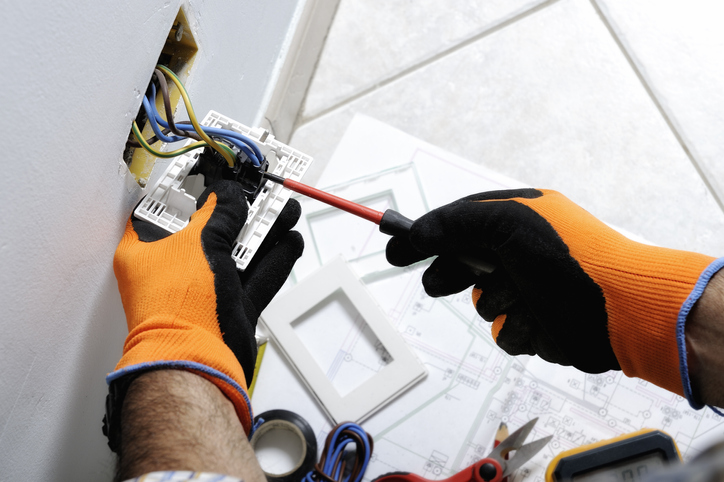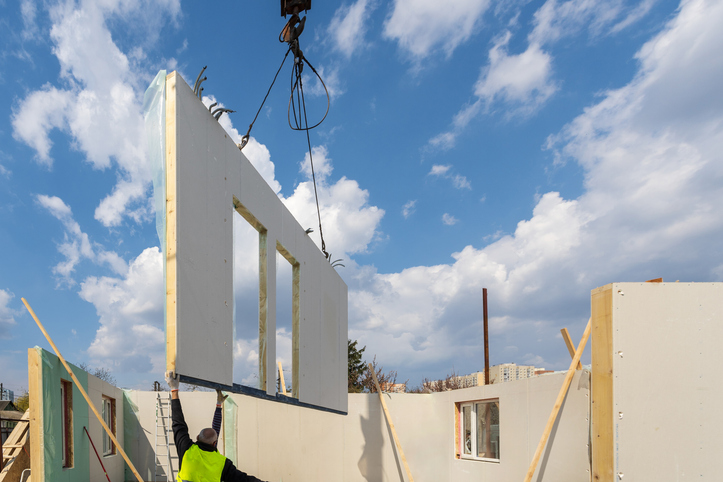Tag: construction careers
5 Opportunities For Advancement After Construction College
October 04, 2022
Learning the core principles of electricity and construction is a great way to begin your career. However, you may be wondering exactly how you might continue to advance your career after graduation. Work is often more satisfying when there are opportunities to progress and seek higher, more lucrative positions for yourself. Luckily, you have many options at your disposal when you train as a Construction and Maintenance Electrician with the North American Trade Schools. Below, explore five great opportunities for advancement available with the skill set you’ll gain during your program.
1. Start an Electrical Apprenticeship to Open Doors in Your Career
Electrical construction is a lucrative and interesting field with many opportunities for career advancement and many different work environments to choose from. To open doors in this field, you should first enrol in an electrical apprenticeship after construction college with NATS. This way, you’ll gain all of the hands-on experience you’ll need to wire industrial or residential buildings safely and effectively. When looking for an apprenticeship, do your research and select a reputable company that consistently leaves customers satisfied. You’ll want to learn how to be an outstanding electrician first in order to continue advancing your career.

2. Become a Journeyman Electrician After Construction College
A journeyman electrician is qualified to work on all sorts of electrical systems. The job includes installing, repairing, and maintaining these systems within various settings. After completing your training, taking a four-year apprenticeship, and completing 6000 hours of technical, on-the-job training, you’ll be equipped with the skills for this career. The experience you gain in this position will prepare you to become a master electrician, which will significantly increase opportunities for growth and earning potential.
3. Consider Becoming an Electrical Inspector
After you’ve been working in the field for some time and have developed a degree of expertise, you might consider becoming an electrical inspector. The position involves inspecting generating systems, appliances, electrical wiring, and motors. You’ll work primarily on construction sites and in homes, ensuring that electrical systems are up to code and in good working condition. An electrical inspection may also involve making repairs to bring systems up to standard.

4. Are you a Good Teacher? Become an Electrical Instructor
Once you’ve gained confidence in your skills after graduating from construction school, instructing is a great option. This career path is very rewarding as you can use your knowledge and experience to help others pursue a career they’re passionate about. Responsibilities include planning and preparing learning materials, teaching the core principles of electrical technology, and adapting teaching methods to meet the needs of each student. In some cases, you may be asked to contribute to program planning.
5. Work For Yourself as a General Contractor
Have you always wanted to try your hand at business? You’re certainly not alone. Entrepreneurship can be extremely lucrative and fun, especially in the construction sector! Once you’ve become a master electrician, which involves three years of field experience and passing a licensing exam, you can run your own electrical company and enjoy the freedom and limitless possibilities that come with entrepreneurship. General contractors have the opportunity to work in industrial, commercial, and residential environments, depending on what clients they cater to.
Ready to start your path in one of the construction careers?
Contact NATS for more information!
5 Soft Skills Necessary for Success in Construction Careers
August 23, 2022
Construction careers are multi-faceted and they often require workers to wear multiple hats and carry out a wide variety of duties. In addition to practical construction skills, there are several soft skills that can boost your ability to reach your career goals. The soft skills you’ll develop in training and on the job sites will help you create the right mindset to face workplace challenges head-on. Let’s explore a few of them!
1. Effective Communication Skills Are a Must for Efficiency on Site
Effective communication is the key to a productive construction site. It involves being able to listen, understand, and express yourself accurately and clearly. There are several types of communication that every aspiring construction worker should master. Not only will you need to have the skills to coordinate with your co-workers but also with clients and different people across the supply chain. Each type of interaction requires you to communicate differently.
2. Use Your Knowledge from Construction College to Develop Problem-Solving Skills
Throughout your construction career, you’ll likely be required to come up with solutions to pressing issues on the spot. This certainly takes practice, but with the right training from a construction college and some experience under your belt, you will have the knowledge you need to quickly weigh the pros and cons of different solutions and make the right decision for the issue at hand. Want to develop a mind for problem-solving? You’ll have the chance to exercise these skills in our Construction & Maintenance Electrician Pre-Apprenticeship program where you’ll learn to come up with different home wiring solutions, how to interpret codes, analyze and repair machine controls, and more.

3. Mental Clarity and Focus With Stress-Management Skills
In a construction career, there will be a lot going on around you and often many different tasks will demand your attention at once. Though this is the perfect work environment for someone who likes a dynamic, hands-on work life, you’ll certainly experience some stress from time to time. Your ability to manage it will determine the extent to which you can perform your duties with mental clarity and focus. You can practice stress management throughout construction school by managing your time well, practicing self-care, and asking for help when you need it.
4. Be Flexible and Adapt to Work Through Inevitable Setbacks
As we discussed, construction sites can get very busy and on any given project, there’s a possibility that something will go wrong–or at least not exactly according to plan. In situations like these, it’s important to be able to quickly adapt to new circumstances and work with whatever you have at your disposal to get the job done. Your team will certainly appreciate your ability to switch gears and prioritize tasks sensibly when setbacks arise and you’re prepared to relocate when needed.

5. Have Commercial Awareness to Ensure Profitability
Whether you plan to run your own construction business or be a valued team member, understanding commercial demand will help you produce results that clients are happy with. In addition, commercial awareness helps you adapt to market trends and world events that may affect the construction industry. One way to improve in this area is to regularly keep up with construction news. In addition, by getting trained with us in both the classroom and in practical labs, you will learn everything you need to perform construction work up to an industry standard.
Ready to start training in one of the construction careers?
Contact NATS for more information!
Exploring Construction Careers? Ways to Promote Sustainability in the Field
July 19, 2022
Caring for the environment is becoming increasingly more important, making sustainable construction a key part of the process. According to research, annual global construction waste is anticipated to reach 2.2 billion tons by 2025. Professionals in construction careers can embrace sustainable practices to reduce this number and make a positive difference.
Sustainable construction can typically be viewed as any kind of construction practice that serves to reduce its impact on the environment. Typically, this involves being environmentally conscious when starting construction projects—choosing the right materials and methods to minimize energy consumption or waste production.
Read on to learn about how professionals in the industry can embrace sustainability and contribute to protecting the environment through their work.
Selecting Environmentally-Friendly Construction Materials
Before starting a construction project, professionals can begin by selecting sustainable materials. These materials do not negatively impact the environment nor do they play a role in draining natural resources. Here, it’s best to avoid using non-renewable and scarce materials and prioritize reclaimed materials over new ones.
Professionals can consider using bamboo, recycled plastic, laminated timber, ferrock and hempcrete when constructing green buildings—ones that are environmentally responsible and resource-efficient. It’s also good practice for professionals in construction careers to aim for using fewer materials and opting for ones with low embodied energy. By taking on this approach, construction professionals can reduce their energy consumption, better protect the environment and decrease the carbon footprint of their projects.

Embracing Sustainable Construction Methods After Construction School
Prefabricated construction, also referred to as offsite or modular construction, is when parts of a structure are assembled at a manufacturing site before being transported to their final destination. This technique is considered to be more sustainable as it promotes factory-based manufacturing with more affordable operating costs.
In fact, it’s even been noted that this construction method uses up to 67% less energy than a traditional site. Because manufacturers would be more able to accurately estimate the necessary materials, they can reduce waste by 50% compared to conventional construction.
Interestingly, buildings developed using the prefabricated approach can even be recycled and repurposed over time, ultimately reducing waste. Students in construction school can embrace these methods in their careers to build a more sustainable future.

Managing Construction Waste With the Environment in Mind
Reducing waste is a key way to promote sustainability in construction. This can be done by carefully planning waste management efforts, anticipating potential waste, preparing sufficient bins for separating waste, estimating the right amount of materials and identifying recyclable materials.
Another valuable approach is to prioritize deconstruction over demolition. That’s because demolition is typically more destructive, preventing professionals from preserving reusable materials. By opting for deconstruction, professionals can disassemble structures to salvage reusable materials and save them for future projects. Adopting these approaches and taking active measures to promote sustainability in the field can help reduce our impact on the environment.
Thinking of attending a construction college?
Contact NATS for more information!
If You’re in Construction College, Here’s What You Need to Know About Electrical Motor Theory
July 20, 2021
Working in the electrical industry requires knowledge of one of the fundamental components of modern construction: electric motors. From power tools to household appliances to industrial applications, electric motors are found everywhere. Essentially, an electric motor is a machine used to convert electrical energy into mechanical energy. Electricity is passed through a coil to produce the power to drive a machine.
Given their availability in today’s world, knowledge of the theory and application of electrical motors is essential for anyone hoping to pursue a career in the field of electrical construction. Skilled professionals should have a complete understanding of electrical motor theory and its application in residential, commercial, and industrial systems. If you’re considering a career as a construction and maintenance electrician, here’s a quick look at the fundamentals of electrical motor theory!
How Do Electric Motors Work?
The electric motor works according to an interaction between the electric current and the magnetic field, which generates a force to make the shaft rotate. In other words, when an electric current passes through a coil, a magnetic field is generated that causes the coil to rotate on its own axis. Most electric motors today work according to this principle of electromagnetic induction. The mechanics of a generator work in much the same way as an electric motor – however, a generator works in the opposite direction, converting mechanical energy into electrical energy.
Students in construction college learn the principles and applications of electricity to prepare them for competitive careers as electrical control assemblers, electrical technicians, and more.

Types of Electrical Motors
Electric motors can be classified according to their power source, construction, motion output, and application. Typical motors are equipped to provide sufficient mechanical power for industrial uses in pumps, fans, power tools, and disk drives. Today, the most commonly used electrical motors are AC motors and DC motors.
DC (Direct Current) motors are widely used because they come with a pre-existing power distribution system. Their speed can be adjusted through the intensity of the electric current. The ability to control the speed makes them a popular choice for home appliances, vehicles, and elevators.
AC (Alternating Current) motors are able to reverse the direction of the electric current at regular intervals. This type of motor uses magnetic forces to propel the current through the device. The current creates a rotating magnetic field that can move the rotor. With a low starting power and controlled acceleration, AC motors are suitable for instrumentation and industrial applications.
Trained electricians pursuing a career in construction will be able to distinguish the appropriate uses of different types of electrical motors.

Advantages of Electrical Motors in Construction Careers
In application, electric motors have several advantages over normal engines. When it comes to their comparative power, the horsepower rating is similar – however, the cost of electric motors is significantly lower than fossil fuel engines. These motors also don’t use fuel, nor do they require the maintenance of engine oil. In that sense, electric motors require little maintenance with a lifespan of up to 30,000 hours if maintained properly. Not to mention, electric motors can be widely used across different appliances, including machine tools, ships, paper mills, motor vehicles, as well as heating and ventilation systems. With knowledge of the fundamental workings of electric motors, students in construction are prepared for a modern and practical career path.
Are you interested in construction careers?
Contact NATS today to learn more about our program!
5 Tips for Improving On-Site Safety for Professionals in Construction Careers
May 04, 2021
At any construction site, it’s important to take the proper precautions to avoid accidents at all times–especially when dealing with electricity. Electrical safety is one of the primary safety concerns within a construction site due to the risks electricity poses. If you’re considering a career as a construction and maintenance electrician, read on to discover five different ways to improve on-site safety during your career.
1. Those in Construction Careers Should Wear Personal Protective Equipment
Wearing personal protective equipment is the most important step that individuals can take to ensure their safety when working on a construction site. Within an area of electrical work, those in construction careers should wear footwear and gloves. When working in the vicinity of electrical wiring, a worker’s personal protective equipment should also include fire-resistant helmets and face shields in order to provide defense against potential shocks. While the level of protection depends on the amount of electricity a worker is exposed to, suiting up in proper personal protective equipment is always necessary when working on any construction site.

2. Choose the Right Testing Equipment
When working with electricity, using high-quality testing equipment is essential in order to assess the risk involved in any operation. Testing equipment, such as: receptacle testers, voltage detectors, and clamp metres, should be used in order to check wiring. This is to determine whether it’s grounded, dead, or requires safety gear. Using testing equipment is essential in preventing potential electrical accidents.
3. Use Circuit Breakers and Voltage Regulators to Avoid Electrical Issues
Accidents can happen despite taking preventative measures. If you’re seeking a career in construction, it’s important to be able to manage a potential crisis in order to prevent further damage. The best way to respond to emergencies is to use voltage regulators and circuit breakers. These devices will regulate power and protect against equipment damage in the event of a short circuit, a power surge, or another problem.

4. Determine Electrical Hazards Through Proper Signage
On a construction site, a lack of awareness of potential electrical hazards may lead to electrical accidents. Project management software can be used to identify and track electrical hazards as they arise throughout the construction process. After the identification process, proper signage should be used to inform workers where electrical hazards are located within a construction site. Signage should include easy-to-read illustrations and language in order to ensure that all workers can understand the present risks. Utilizing proper signage throughout a construction site will improve safety and reduce the danger that on-site workers are exposed to.
5. Never Work in Wet Conditions
Anyone familiar with electricity knows that when water comes into contact with electrical equipment and infrastructure, the risk of electrocution increases. With this in mind, all electrical equipment should be protected against possible exposure to water in a construction site. If water does infiltrate the site’s electrical infrastructure, shutting off the power supply immediately is the best way to prevent an accident.
Following safety protocols can prevent accidents and save lives. In order to ensure the safety of all workers within a construction site, it’s important to incorporate these tips into an electrical safety plan and strictly implement them in practice.
Ready to attend construction college?
Launch your career with a program at the North American Trade Schools today!
Trends to Watch in 2021 for Those With Construction Careers
December 29, 2020
Within the construction industry, businesses are often looking to adopt trends that will cut costs and improve the way that business, and construction itself, is done. Advancements in technology could have a huge impact on the future of the construction industry. In 2020, the COVID-19 pandemic proved that adapting and innovating–while utilizing available technologies–was essential to continuing operations throughout the many disruptions that construction companies and employees saw.
These four rising trends highlight how the construction industry is changing and innovating–as it gives us a sneak peek into what to expect in 2021.
Those in Construction Careers Will Want to Watch for 3D Printing
3D printing is a technology that’s already being used in the construction industry to make custom projects more affordable, as well as to help complete projects at a faster rate. 3D printing is typically used to aid larger projects by building certain smaller components to fit into them. The capacities of 3D printing are still being explored, but those with a career in construction should look for this technology in 2021.
The Use of Big Data
There’s a lot of potential for the construction industry when it comes to big data. Big data is a great tool for construction companies to use to determine and analyze risk. The use of big data allows construction companies to apply algorithms to construction data, sizing a project up against market and material trends, as well as the weather. Construction companies can better manage risk with big data, as they’ll be better informed about the correct amount of resources to use. This will be better equipped for potential losses. The use of big data for risk management increased in 2020, and so there’s a good chance that it’ll continue in 2021.
Prefabricated Buildings and Modular Construction
In an era where separate space is increasingly necessary, prefabricated buildings and modular construction have come to flourish. More and more businesses are requiring temporary solutions to the social-distancing requirements and strains which have been imposed by the COVID-19 pandemic. Hospitals need extra rooms, businesses need extra offices, and homeowners might just need another space where they can work from home or decompress. Modular construction and prefabricated buildings are a great option for temporary, efficient, and affordable expansion. This is certainly a trend that could stick with the construction industry, keeping those in construction careers busy.

The Use of Design Technology
Building Information Modeling (BIM), or what contractors sometimes call Virtual Design and Construction (VDC), is on the rise as a means of virtually designing and constructing a building before it is physically built. It allows professionals to see how a building would hold up when constructed, making note of potential pitfalls, budgetary excesses, and more. The increasing use of this technology is helping professionals keep construction costs down and save time. By using BIM, designers are also able to think bigger and bolder in terms of the structures they create. For these reasons, it’s safe to say that the use of these helpful design technologies could continue to expand in 2021.
Are you ready to see these trends in action?
Enroll in construction college at the North American Trade School today.
Have you been considering enrolling in a training program for quite some time? If so, it’s the perfect time to stop making excuses and start making progress!
Trade school is an excellent option for students looking for an affordable and efficient education that will lead to a lucrative and secure career with great job satisfaction. There are so may trade and construction careers available in Canada, within many different industries, that you’re bound to find your ideal fit in the trades.
The first step towards starting your career, though, is enrolling in a training program so you have the knowledge you need to succeed. If you’re hesitant to make the leap, keep reading to discover some great excuse-proof reasons why you should take control of your future and enroll in trade school!
Excuse-proof Reasons to Enroll at a Trade School
You can’t argue with these great reasons to enroll in trade school!
Receive Highly Relevant and Applied Training
- Learn in a hands-on environment
- Begin practicing your new skills right away
- Apply all the knowledge you gain directly to your career
A Variety of Exciting Career Options
You can study to become a:
- Welder
- HVAC Technician
- Solar Energy Technician
- Cabinetmaker
- Home Renovation Technician
- Construction & Maintenance Electrician
- Electrical Technology Technician
- And more!
A Shorter & More Affordable Program than a Traditional University Degree
- Skip a 4-year degree
- Begin working quickly after graduation
- Financial options, like the following, help students pay for their studies:
- Student Lines of Credit
- Ontario Student Assistance Program (OSAP)
- Second Careers
- RESP
- Lifelong Learning Plan
- Employment Ontario
- Monthly Payment Plan
The Trades Are Booming Across Canada
- 6 million skilled job openings by 2021
- Trades workers make an hourly wage that’s about 6% higher than other occupations
Begin a Career That Aligns with Your Passions
- Train for a career you’re excited about
- Work in a hands-on environment
- See the fruits of your labour
- Have the opportunity to open your own business
Fun fact: Professionals working in the trades report higher job satisfaction
Receive Personalized Help Finding Your Ideal Career
- Learn how to create an effective cover letter, resume, and portfolio
- Benefit from private job listings through your college
- Choose a school with a Hire a Grad program
Experienced Instructors
- Receive career advice from experienced industry professionals
- Learn from knowledgeable and passionate instructors
Sources:
https://www.ontariocolleges.ca/colleges/paying-for-college
https://business.financialpost.com/executive/making-a-university-degree-pay-off
https://www.macleans.ca/work/jobs/the-future-of-jobs-in-canada/







